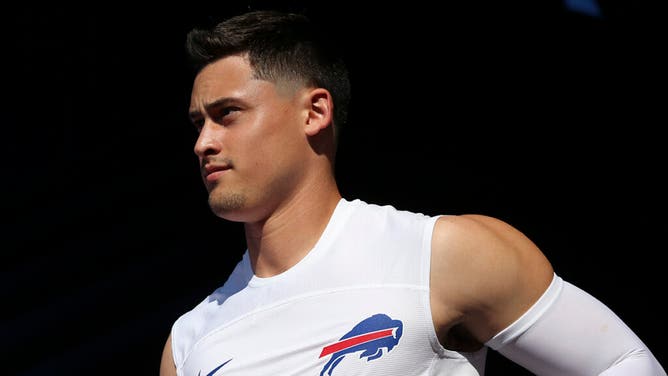Matt Araiza’s Case Is A Failure Of Journalism Across Most Of Sports Media | Mary Katharine Ham
In spring 2022, Matt Araiza was a stand-out San Diego State kicker and a 6th-round NFL draft pick known as “Punt God” for his foot with a 50-yard average.
By August, Araiza was best known as the accused in a civil suit alleging the gang rape, along with two teammates, of an intoxicated 17-year-old at a Halloween party during his senior year of college. He was dropped by the Buffalo Bills during his rookie preseason after the allegations emerged.
We now know that in December 2022, prosecutors declined to bring charges against Araiza because they determined he was not at the party in question at the time of the alleged gang rape.
In 2023, Where Does Matt Araiza Go To Get His Reputation And Career Back?
The case is another reminder that while the momentum of the #metoo era rightly brought plenty of wrongdoing to light, it cannot mean abandoning due process.
Araiza, who has maintained his innocence and said any sexual contact he had with the accuser was consensual, fought allegations in three different courts— the court of public opinion, criminal and civil arenas.
As is often the case, in the court of public opinion, there was very little reference to the idea that he might be innocent until proven otherwise. Cynthia Frelund of the NFL Network called it “scary” that in reporting on the Bills’ preseason, she “had been standing four feet from him… for the entire broadcast. It is yucky and awful.”
Jemele Hill of The Atlantic, formerly of ESPN, assumed Araiza’s guilt and criticized both SDSU and law enforcement for not acting when the accuser reported her experience after the party.
Araiza’s accuser got national headlines for when the CBS Evening News aired a hidden-identity interview with her.
After noting Araiza was dropped by the Bills after the civil suit went public, the CBS reporter Lilia Luciano intoned, “Araiza’s accuser wonders why his career even got that far,” before briefly noting at the end of the segment, “no criminal charges have been filed.”
Prosecutors Believe Araiza Was Not At Party When Alleged Gang Rape Took Place
Now we know why no charges were filed. Prosecutors’ investigation included 35 witness interviews and four terabytes of cell phone data obtained from partygoers with search warrants. Araiza appears in none of the videos, according to prosecutors, and a witness says he left the party an hour before the taped encounters and the time of the alleged rape.
“In looking at the videos,” a prosecutor tells the accuser in a transcript of a December 2022 meeting with her and her lawyer. “I absolutely cannot prove any forcible sexual assault based upon what happened.”
Her lawyer in the civil suit says that shouldn’t matter.
“The videos do not prove Matt Araiza was never present, just that the cameras did not capture his image during the few seconds each lasted,” he wrote.

Former Bills punter Matt Araiza. (Getty Images)
Civil cases carry a lower burden of proof than criminal cases but Araiza is being asked to prove a negative in a legal standard that no one— famous or not, man or woman, any color or creed— should be asked to meet. Call it the Kavanaugh standard.
Many will argue as justification for this standard that figures like Araiza— male, white, athlete— have long been given too much societal benefit of the doubt and leniency in the justice system. Certainly, sometimes that’s true. But it was also the justification for ruining three other young men’s lives over a party gone wrong. Three Duke lacrosse players were wrongfully accused of rape in 2006, as much of media eagerly played along. Durham District Attorney Mike Nifong was later disbarred for lying about evidence in the case. A year after the incident, the state Attorney General called the case a “tragic rush to accuse and a failure to verify serious allegations,” and took the unusual step of declaring Reade Seligman, Colin Finnerty, and David Evans “innocent of these charges.”
Remember The Lessons Learned From Duke, Brian Banks
Letting media coverage or prosecution of a case get ahead of the evidence according to the social justice demands of the parties involved doesn’t make for good journalism or a good justice system.
In a less well-known but tragic case of miscarried justice, another promising potential college and NFL talent was derailed in 2002. At the age of 16, Brian Banks — a California blue-chip already recruited by USC’s then-head coach Pete Carroll — was falsely accused of rape by classmate Wanetta Gibson.
Despite proclaiming his innocence, Banks took a plea deal on advice of his lawyer and served five years in prison and five years probation while his accuser was awarded more than $750,000 in a suit against the school system.
Gibson later contacted Banks via Facebook. He agreed to meet up with her and she recanted her accusation in a recording captured by Banks and a private investigator. Banks and the school system were able to claw back some of the payments made to the false accuser, but Banks was unable to claw back 10 years of his life.
Carroll gave him a shot at a training camp for the Seahawks in 2012 and Banks later played briefly for the Atlanta Falcons before getting a job with operations in the NFL corporate offices. He is now a motivational speaker with a biopic of his ordeal.
The exonerations of Reade Seligman, Colin Finnerty, David Evans, and Brian Banks, got a fraction of the coverage of their downfalls.
“I can only hope that now people will assess me on the facts and not what was falsely claimed in both the civil suit and in the press,” Araiza told ProFootball Talk.
If only it was a lesson the media could learn.